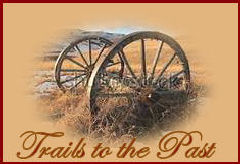|
Progressive Men of
Minnesota
Minneapolis Journal
1897
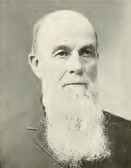 NATHAN
PIERCE COLBURN The name at the head of this sketch
is that of a man who has helped in the upbuilding
of this state since its infancy, having served as
a member in its constitutional convention and
having been a prominent member of the legal
profession of the state since 1856. NATHAN
PIERCE COLBURN The name at the head of this sketch
is that of a man who has helped in the upbuilding
of this state since its infancy, having served as
a member in its constitutional convention and
having been a prominent member of the legal
profession of the state since 1856.
Nathan Pierce Colburn
was born at Hebron, New Hampshire, December 22,
1825, the son of Abel Colburn and Deborah Phelps
(Colburn). His ancestors on his fathers side were
of English descent, and on his mother’s, English
and Irish. His maternal grandfather, Samuel
Phelps, was one of the first settlers of Hebron,
New Hampshire, a soldier in the Revolutionary War,
and a skilled worker in wooden ware. Abel Colburn,
the father of the subject of this sketch, was a
farmer and stone cutter, in moderate financial
circumstances. He was a
soldier in the war of 1812. Nathan holds the
memory of his mother in final reverence. She was a
woman of strong mental and physical powers, well
informed, and reared a family of nine children.
She died at the age of ninety-three, retaining her
mental faculties to the last.
The subject of this sketch
received his early education in the
public
schools of Hebron, Campton and Plymouth, New
Hampshire. He was obliged to discontinue his
studies, however, at the age of fourteen. When he
was about fifteen he removed with his parents to
Quincy, Massachusetts, and at the age of sixteen
was apprenticed to learn the cabinet trade at
Reading.
He followed this line of business for
nearly twelve years, a part of the time working at
the bench, and for a time engaged in business for
himself. The latter five years of this time he
resided at South Reading (now Wakefield), and
while there was made justice of the peace and
twice elected a member of the board of select men,
assessor and overseer of the poor. In the early
part of 1854 he was appointed deputy sheriff of
Middlesex County, Massachusetts, and held that
office until he came West.
He located at Waukokee,
Fillmore County, Minnesota, in October, 1855,
where he and his brother Joseph erected a steam
sawmill, one of the first in that part of the
country. He sold out his interest to his brother
in March, 1857, and entered the law office of the
late H. C. Butler, of Rochester, then located at
Carimona, and resumed the reading of law, which he
had pursued while deputy sheriff in Massachusetts.
In the fall of 1857 he was admitted to the bar. In
June, 1858, he removed to Preston and commenced
the practice of his profession. He has since
practiced in the state and United States courts up
to five years ago, when he retired from active
business. From 1865 to 1870 he was in partnership
with Judge H. R. Wells; from 1881 to 1883 with
Judge Henry S. Bassett, and from 1883 to 1888 with
his son, Warren E. Colburn. He removed to
Rushford, Minnesota, in September, 1883, where he
has since resided. In his early life Mr. Colburn
took a great deal of interest in military
affairs.
He was elected
first lieutenant of an
independent company when twenty-two years of age
at Reading, Massachusetts; at twenty-four was
elected major of the Fourth Regiment, and at
twenty-five was elected colonel of the Seventh
Regiment, which regiment he commanded five years,
and up to the time of his removal to
Minnesota.
The Seventh being one of the best regiments
in the state was ordered out on most public
occasions, and had the honor of escorting Daniel
Webster through the city of Boston on the occasion
of his last speech in Faneull Hall on his return
from Washington in 1852.
In the summer of 1862,
at the time of the Indian outbreak, Mr. Colburn
was in St. Paul, and at the request of Gov. Ramsey
returned home and organized a company of one
hundred and twenty mounted men, which started
west, making headquarters at Winnebago City. For
five weeks the company was engaged in scouting and
building earthworks, and was then relieved by a
company of regulars: but they had no skirmish with
the Indians, as they kept beyond their reach. On
March 2, 1863, at the request of Hon. William
Windom, President Lincoln commissioned Mr. Colburn
as paymaster in the army, and he joined the
Department of the Missouri. He served in that
department about one year, when failing health
made his resignation necessary, and he returned to
Minnesota and resumed his law practice. Mr.
Colburn followed in the footsteps of his father
and affiliated with the Democratic party when he
first became a voter, but being opposed to the
extension of slavery he left the party during the
administration of Franklin Pierce. For a time he
acted with the Free Soil party, but in the summer
of 1855 he assisted in organizing the Republican
party in Middlesex County,
Massachusetts.
Although always
interested in politics, Mr. Colburn has never
sought office; what official honors he has
received have come to him unsought. In 1857 he
served as a member of the constitutional
convention. In the following year he was elected
to the lower house of the legislature, but the
former legislature having provided by law that no
session should be held the next year unless called
together by the governor, no session was held. He
served as a member of the house in the
legislatures of 1866 and 1871, at both sessions
serving as chairman of the judiciary committee. He
has also served ten years as county attorney,
twenty-four years as a member of the board of
education at Preston and Rushford, and one year as
mayor of the latter place. Mr. Colburn is a Master
Mason, a member of the Eastern Star, and has
belonged to the Odd Fellows, Sons of Temperance
and Good Templars. He is a Universalist in belief,
but not a member of any church.
In April, 1850, Mr. Colburn
was married at South Reading, Massachusetts, to
Mary Jane Fames. Four children were born to them,
only one of whom is now living, Warren E. Colburn,
senior member of the firm of W. E. Colburn &
Co., of the Merchants Exchange Bank, South
Chicago, Illinois. Mrs.
Colburn died at Preston, July 9, 1874. September
16th, 1877, Mr. Colburn was married to Mrs. Helen
M. Tinkham, his present wife, at Batavia, New
York.
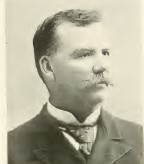 BENJAMIN FRANKLIN FARMER The
subject of this sketch is the Mayor of Spring
Valley, one of the early settlers of the place and
a man who has done much to build up that
community. He was born in Burke, Caledonia County,
Vermont, July 14, 1831 the son of Hiram and Salina
Snow Farmer. On his father’s side Mr. Farmer is of
English descent, his grandfather, Benjamin Farmer,
being a soldier in the Revolutionary War, On his
mother’s side the family stock is Scotch. They
settled in New Hampshire and engaged in the
mercantile business. Benjamin’s
father moved to Madison, Lake County Ohio, in
1833, settling on a farm on the shores of Lake
Erie and reared his family there. BENJAMIN FRANKLIN FARMER The
subject of this sketch is the Mayor of Spring
Valley, one of the early settlers of the place and
a man who has done much to build up that
community. He was born in Burke, Caledonia County,
Vermont, July 14, 1831 the son of Hiram and Salina
Snow Farmer. On his father’s side Mr. Farmer is of
English descent, his grandfather, Benjamin Farmer,
being a soldier in the Revolutionary War, On his
mother’s side the family stock is Scotch. They
settled in New Hampshire and engaged in the
mercantile business. Benjamin’s
father moved to Madison, Lake County Ohio, in
1833, settling on a farm on the shores of Lake
Erie and reared his family there.
Benjamin attended the
district school most of the time until he was
seventeen years of age. He was then apprenticed at
Unionville, Ohio, to learn the blacksmith trade.
During his stay there he assisted in constructing
the iron work on thirteen lake vessels. The winter
of 1857 he met a gentleman who had been in the
West and who gave him such an attractive
description of Minnesota that he made up his mind
to see it. He arrived in Spring Valley April 24,
of that year. In a few days he had opened a shop
and was installed as the village blacksmith. He
was employed at his trade in 1861, when, in
response to the call for volunteers, he raised a
company of forty-five men, took them to Rochester
and about forty were mustered into service.
Mr. Farmer was
appointed assistant United States Marshal and
continued in that branch of the service for a
number of years. In 1865 he was appointed
postmaster of Spring Walley and held the office
for sixteen years. In 1871, in company with J. C.
Easton, now of La Crosse, and his brother, J. O.
Farmer, he organized the Bank of Spring Valley,
was appointed its cashier and has held that
position ever since, although in the meantime the
other interests in the bank have changed hands.
Mr. Farmer has been interested in everything
tending to build up his town and community. He was
elected Mayor of Spring Valley in 1892, and during
his term secured the construction of the water
works; assisted in organizing the Spring Valley
Electric Light and Investment Company of which he
was elected president, and was largely
instrumental in establishing the first creamery
started in Minnesota, an enterprise which proved
profitable both to the farmers and for the
proprietors.
Mr. Farmer is a member of the
Masonic order and has taken the thirty-second
degree in Masonry. He is also a Knight Templar and
Grand Generalissimo in the Grand Commandry of
Minnesota. He is also a Shriner and a member of
the Knights of Pythias. His church connections are
with the First Congregational society of Spring
Valley, of whose board of trustees he is
president. He is also president of the Spring
Valley high school board. He was married in
Unionville, Ohio, in 1855, to Miss Annette L.
Wheeler, who bore him two children, Katie L, now
Mrs. F. V. Edwards, and Nellie M., who died in
infancy. In 1877 the mother of these children
died, and the following year Mr. Farmer married
Helen E.
Wheeler sister of the first wife. In 1882
they adopted a young girl from New York City and
gave her the name of Nellie M. Farmer. She has
recently married L. M. Scofield, a relative of
Gen. Schofield.
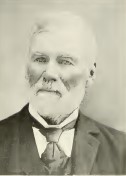 JOHN
OUINCY FARMER of Spring Valley, Minnesota, has cut
an important figure in the history of Southeastern
Minnesota during the last thirty years. He was
born in Burke, Caledonia County, Vermont, August
5, 1823. The family residence was a log house on
Burke Hill. The Farmers were of English descent.
The grandfather, Benjamin Farmer, was a soldier in
the Revolutionary army, and his grandson, the
subject of this sketch, recalls having heard him
describe several battles in which he participated,
among them being the battle of Lexington. On his
mother’s side the descent is from a Scotch family
by the name of Snow, and Grandfather Snow was
engaged in the mercantile business. John Quincy
was the son of Hiram and Salina Snow (Farmer), who
removed from Vermont to Madison, Lake County,
Ohio, in 1833, and settled on a farm near the
shore of Lake Eric. JOHN
OUINCY FARMER of Spring Valley, Minnesota, has cut
an important figure in the history of Southeastern
Minnesota during the last thirty years. He was
born in Burke, Caledonia County, Vermont, August
5, 1823. The family residence was a log house on
Burke Hill. The Farmers were of English descent.
The grandfather, Benjamin Farmer, was a soldier in
the Revolutionary army, and his grandson, the
subject of this sketch, recalls having heard him
describe several battles in which he participated,
among them being the battle of Lexington. On his
mother’s side the descent is from a Scotch family
by the name of Snow, and Grandfather Snow was
engaged in the mercantile business. John Quincy
was the son of Hiram and Salina Snow (Farmer), who
removed from Vermont to Madison, Lake County,
Ohio, in 1833, and settled on a farm near the
shore of Lake Eric.
His opportunities for
education were quite limited, his father being
unable to afford him any other facilities than
those of the district school during the winter
months. When he arrived at the age of seventeen,
however, he began to realize that he was deficient
in the matter of schooling, and, having obtained
permission from his father to attend an academy,
set about earning money to pay his expenses,
receiving only about fifty cents a day. He first
attended an academy in the neighborhood, next at
Plainsville, and finally at Grand River institute,
Ashtabula, County, Ohio. But the most important
part of his education was received at Twinsburg,
Summit County, Ohio, at an academy conducted by
Rev.
Samuel Bissel, a man who has probably
assisted more young people to acquire an education
than any other man in Ohio.
John Quincy taught a
district school for several terms, his
compensation being ordinarily $14 a month, with
the privilege of boarding around among the parents
of the scholars. He began the study of law at
Painsville with Perkins & Osborn. He
afterwards attended the law school of Prof.
Fowler, at Palston Springs, New York. After
graduating there he came West and spent some time
in looking up a location in Wisconsin. In 1850 he
settled at Omro and went into practice. In
December of that year he returned home with the
intention of getting married and returning in the
spring, but while at home he was persuaded by
Brewster Randall, of Conneaut, Ohio, to go into
his law office and take up the practice which Mr.
Randall wished to lay down. This proved a very
profitable arrangement, and on the 17th of
November, 1852, Mr. Farmer married Maria N.
Carpender, daughter of Dr. Joseph R. Carpender, of
Painsville, Ohio. He remained in practice at
Conneaut about six years, then removed to
Ashtabula, where he formed a partnership with Hon.
L. S.
Sherman. He remained there about six years,
having in the meantime served one term as county
attorney.
The health of his wife
failing he came West again, locating in Spring
Valley, Minnesota, where his father’s people had
already preceded him. The benefit to his wife’s
health did not prove to be permanent, however, and
she died March 6, 1866, leaving two sons, George
R. and Charles J., who still live, and a daughter,
Carrie M., who died at the age of five years.
On his arrival in
Minnesota, Mr. Farmer gave up the practice of law
and engaged in farming, but his brother, James D.,
who was engaged in practice at Spring Valley,
gradually interested him in his practice and it
resulted in Mr. Farmer’s returning to his
profession. In 1865 he was elected a member of the
lower house of the legislature from Fillmore
County, and was re-elected in the fall of 1866. He
became a candidate for speaker of the house and
was elected. In 1867 he was again elected to the
house and re-elected speaker without opposition.
In 1870 he was elected to the state senate for two
years, but the new apportionment law having been
passed that winter he stood for re-election in
1871 and was successful. He was
chairman of the judiciary committee both terms
while in the senate. In 1879 he was elected
district judge of the Tenth judicial district, and
was re-elected in 1886 without opposition. Prior to
the expiration of his second term he announced his
purpose not to be a candidate for re-election.
Nevertheless the Republican convention nominated
him for a third term, but he absolutely refused to
run. Mr. Farmer was president of the Minnesota
Farmers’ Mutual Fire Insurance Association for
about twelve years, an association organized for
the purpose of giving farmers safe insurance on
their property at first cost. He was a Henry Clay
Whig in his politics and helped to organize the
Republican party, with which he has always been
identified. He is a firm believer in protection to
American industry and sound money.
Four years after the death of
his first wife, already noted, he married Susan C.
Sharp, January 13, 1869, who has become the mother
of six boys, John Frederick, John Coy, Daniel
Elvin, Ernest Melvin, Frank C. and James Duane,
all of whom are
living.
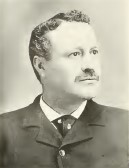 ARCHIBALD DOUGLAS GRAY of
Preston, Fillmore County, Minnesota, is a native
of the state of New York. His
father, Alonzo G. Gray, was a farmer, the son of
Elias Gray, a soldier in the War of 1812. His wife
was Miss Lucy Ann Murch. At the time of the birth
of their son, which occurred on November 13, 1845,
they were living in Chenango County, New York.
During his childhood the family was in poor
circumstances. ARCHIBALD DOUGLAS GRAY of
Preston, Fillmore County, Minnesota, is a native
of the state of New York. His
father, Alonzo G. Gray, was a farmer, the son of
Elias Gray, a soldier in the War of 1812. His wife
was Miss Lucy Ann Murch. At the time of the birth
of their son, which occurred on November 13, 1845,
they were living in Chenango County, New York.
During his childhood the family was in poor
circumstances.
When he was nine years
old the family moved to Newburg, Fillmore County,
Minnesota, where Mr. Gray, Sr., continued to
reside upon a farm until his death in 1896.
Archibald lived with his parents on the farm,
attending school in an old log school house
shingled with shakes and equipped with puncheon
benches and tables. To
complete his education he attended, during one
winter, the select school in Hesper, Iowa, and
supplemented this with two years at the Upper Iowa
University, located at Fayette.
When quite young he
became a student of law, using at first the old
law books belonging to his father, and afterwards
receiving the assistance of Cyrus Wellington, who
was for years a member of his father’s family.
After leaving school, he began teaching school
during the winter season, working on the farm in
the summer and running a threshing machine in the
fall. About this time he was married, in March,
1868, to Miss Emma W. Seelye. For a number of
years he continued school teaching. Late in the
fall of 1877 he was elected Clerk of the Court of
Fillmore County. For the next four years he held
this office and studied law night and day.
In November, 1881, he
was admitted to the bar and began the practice of
his profession. He at once formed a partnership
with R. E. Thompson, with whom he had studied law,
and who was admitted to the bar at the same time
as himself. This partnership has continued to the
present time. Mr. Gray has tried and assisted in
the trial of a great many important cases. In the
prosecution by the government of Drs. Phillips,
Jones and Love, for alleged pension frauds, Gray
& Thompson assisted in securing the acquittal
of these gentlemen. In the fall of 1894, the firm
assisted the county attorney of Winneshiek County,
Iowa, in the trial of what is known the Carter
murder case. The defendant was found guilty of
murder in the first degree. This was one of the
greatest murder trials in the history of Iowa. But
their practice is by no means entirely in the
criminal line. The name of the firm may be found
in the state reports, connected with some of the
most important cases recorded. Mr. Gray has always
voted the straight Republican ticket. From the
time he was twenty-one years old until he went to
Preston, he held the office of Justice of the
Peace, and for many years he was County
Commissioner and chairman of the board, which he
resigned when elected Clerk of the Court. The
latter office he held until January, 1891. In 1892
he was nominated and elected Republican
presidential elector for Minnesota and cast his
vote for Harrison. He represented the First
congressional district in the National Republican
Convention at St. Louis in June, 1896. He is now
chairman of the Republican county committee, a
post which he has frequently held in previous
years.
Mr. and Mrs. Gray have six
children, Miss Stella E. Gray, a student at the
University of Minnesota; Archie D. Gray, who is
studying law with his father: Mrs. Lucy Rasmussen,
the wife of Rev. Henry Rasmussen, of Lanesboro;
Nettie M. Gray, who is a teacher of music, and
Andrew G. and Alton E. Gray who are both
attending
school at Preston.
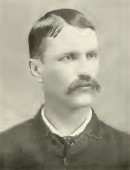 OLIN WILLIS KINGSBURY is a
successful newspaper man of Preston, Fillmore
County, Minnesota. He is the
proprietor of the Courier, a weekly Populist
paper, published at Preston, and of die Harmony
Courier, issued at Harmony, in the same county.
Mr. Kingsbury’s father is Martin Kingsbury, a
retired farmer, now living at Central City,
Nebraska, who is a native of Oneida County, New
York. He married Miss Caroline Leach, of the same
county, who, like himself, was well educated and a
teacher. They came to Minnesota in 1853 and
settled in Fillmore County, and their eldest
daughter, Orissa, was the first white child born
in that county. Mr. Kingsbury became the first
justice of the peace in Fillmore County. Both Mr.
and Mrs. Kingsbury take active part in the affairs
of their church. OLIN WILLIS KINGSBURY is a
successful newspaper man of Preston, Fillmore
County, Minnesota. He is the
proprietor of the Courier, a weekly Populist
paper, published at Preston, and of die Harmony
Courier, issued at Harmony, in the same county.
Mr. Kingsbury’s father is Martin Kingsbury, a
retired farmer, now living at Central City,
Nebraska, who is a native of Oneida County, New
York. He married Miss Caroline Leach, of the same
county, who, like himself, was well educated and a
teacher. They came to Minnesota in 1853 and
settled in Fillmore County, and their eldest
daughter, Orissa, was the first white child born
in that county. Mr. Kingsbury became the first
justice of the peace in Fillmore County. Both Mr.
and Mrs. Kingsbury take active part in the affairs
of their church.
Their son, Olin, was
born at Waukokee, Fillmore County, on May 3, 1859.
He had the usual experience of a farmer’s boy in a
new country. It was a course of hard work, scant
schooling and very little to vary the monotony of
existence.
As Mr. Kingsbury grew to manhood he
broadened in his ideas, and studied to fit himself
for a station in life above that in which he found
himself.
During his struggle to get on he taught
school and worked at various employments. For a
while he was in the lumber and sash and door
business in Minneapolis, and for five years he
worked a farm in Fillmore County. On March 4,
1893, he started the Courier at Preston. He had
always been independent in politics and had taken
part in the formation of the Alliance party and
worked for the success of the Populist party from
its beginnings. His fitness for conducting a
Populist paper became manifest. Within a year
after the paper was founded it had the largest
circulation of any paper in the county; within
three years its owner was ready to start another
paper. He chose for this venture the village of
Harmony, a few miles south of Preston, and there
commenced the publication of the Harmony Courier.
Both papers have been a success.
Mr. Kingsbury has never been
a candidate for any office. He has taken a great
interest in co-operation and has been instrumental
in founding several co-operative elevators and
creameries in Fillmore County. He assisted in
founding the first farmers’ creamery in Minnesota.
It was he who originated the movement for the
reduction of the salaries of county officers in
Fillmore County. He is a member of the Odd
Fellows, A. O. U. W. and N. W. L. of H. In 1886
Mr.
Kingsbury was married to Miss Clara M. Kingsbury.
They have two children, Clinton Willis, aged
eight: and Merle Clara, aged
six.
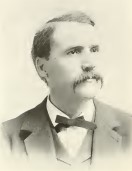 SAMUEL A. LANGUM of Preston,
newspaper man and politician, affords a good
example for the possibilities which lie in the
path of an enterprising and ambitions young man in
a growing western state. Though not yet forty
years of age, Mr. Langum has held a number of
positions of trust and responsibility, and has
reasonable aspirations toward still higher
things.
Mr. Langum’s parents were both born in
Norway.
His father, Andrew J. Langum, came to this
country in 1855 and settled with his wife, whose
maiden name was Julia Swenson, in Fillmore County,
where he has since been engaged in farming and has
achieved independence. He is prominently known as
a layman in the Norwegian Lutheran church, and has
traveled extensively among the people of this
denomination doing missionary work. Mr. and
Mrs.
Langum have raised a family of nine
children, two boys and seven girls. SAMUEL A. LANGUM of Preston,
newspaper man and politician, affords a good
example for the possibilities which lie in the
path of an enterprising and ambitions young man in
a growing western state. Though not yet forty
years of age, Mr. Langum has held a number of
positions of trust and responsibility, and has
reasonable aspirations toward still higher
things.
Mr. Langum’s parents were both born in
Norway.
His father, Andrew J. Langum, came to this
country in 1855 and settled with his wife, whose
maiden name was Julia Swenson, in Fillmore County,
where he has since been engaged in farming and has
achieved independence. He is prominently known as
a layman in the Norwegian Lutheran church, and has
traveled extensively among the people of this
denomination doing missionary work. Mr. and
Mrs.
Langum have raised a family of nine
children, two boys and seven girls.
S. A. Langum was born
in the town of Bloomfield, Fillmore County, on
August 18, 1857. He first attended school in a
little log schoolhouse on the banks of the Root
River, near his home. The schools of those days in
the country districts of Minnesota were not of the
best and the requirements expected in a teacher
were not high. Samuel’s father intended him for
the ministry, and gave him much instruction at
home. When he was only six years old he could read
Norwegian fluently. At the age
of fifteen he was sent to the Marshall Academy,
Marshall, Wisconsin, a school conducted by the
Augustana Synod. After two
years this school was discontinued and for one
year Samuel studied Norwegian literature and
theology with Rev. Mr. Lysness, near Decorah,
Iowa. He continued his studies during the next
year at Augsburg Seminary in Minneapolis.
But he was beginning to
discover that the ministry was not to his taste,
and after a year of school teaching he entered
politics and became deputy register of deeds of
Fillmore County. He held this position for four
years and in 1880, when only twenty-three years of
age, was elected sheriff of Fillmore County. He
was the youngest sheriff in the state and the
first boy born in Fillmore County to be elected to
a county office. Mr. Langum held the sheriff’s
office for six years. In 1886 he purchased the
“Preston Democrat,” changed its politics from
Democratic to Republican—of the stalwart kind and
re-named it the “Preston Times.” He is still its
publisher, and has made the paper a distinct
success. It is largely due to the position of the
paper that the move for municipal improvements has
taken a firm hold in Preston, which is now the
proud possessor of the finest system of water
works and electric lights, on the municipal
ownership plan, of any town of its size in
Minnesota, under Mr. Langum’s management and
editorial direction the Preston Times has been
very aggressive in politics.
In December, 1889, Mr. Langum
was appointed deputy warden of the Minnesota State
Prison at Stillwater, retiring with Warden
Randall, in February, 1891. He served
in the legislature of 1893, after having been
elected by a handsome majority over a fusion
candidate supported by Democrats, Populists and
Prohibitionists. Two years later he was elected
secretary of the state senate, and made such a
record for efficient service that at the session
of 1897 unanimously re-elected. Mr. Langum
has his eye on the office of secretary of state in
1898, and is known as an active candidate for this
nomination He is a member of Malta Commandary No.
25, K. T., of Preston, and has been its recorder
since its organization. Mr. Langum
was married on September 14, 1878, to Miss Emma
McCollum, of Milwaukee. They have had four
children, Alfred, William, Nora and Winnie, of
whom William died in infancy. Mr. Langum
is a member of St. Paul Norwegian Lutheran church
of Preston.
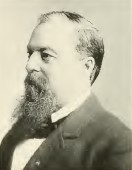 GEORGE ALLAN LOVE
of Preston, Minnesota, was born at
Woodstock McHenry County, Illinois, on March 3,
1853. His father was Robert Love who was a native
of Glasgow, Scotland, where, prior to his
emigration to America in 1853, he held a
responsible position as foreman in one of the
great shipyards of that city. His wife was Miss
Agnes Dixon, also a native of Glasgow. Upon
coming to America, Mr. and Mrs. Love settled in
McHenry County, Illinois, where Mr. Love
engaged in the business of carpenter and builder.
Later he removed to Alamakee County, Iowa, and
after a time, in 1856, to Fillmore County,
Minnesota, where he took a farm in what is now the
town of York. Mr. Love accumulated a competency
and died in 1877 aged sixty-eight. His wife is
still living. GEORGE ALLAN LOVE
of Preston, Minnesota, was born at
Woodstock McHenry County, Illinois, on March 3,
1853. His father was Robert Love who was a native
of Glasgow, Scotland, where, prior to his
emigration to America in 1853, he held a
responsible position as foreman in one of the
great shipyards of that city. His wife was Miss
Agnes Dixon, also a native of Glasgow. Upon
coming to America, Mr. and Mrs. Love settled in
McHenry County, Illinois, where Mr. Love
engaged in the business of carpenter and builder.
Later he removed to Alamakee County, Iowa, and
after a time, in 1856, to Fillmore County,
Minnesota, where he took a farm in what is now the
town of York. Mr. Love accumulated a competency
and died in 1877 aged sixty-eight. His wife is
still living.
Dr. Love
attended the common schools in Fillmore County and
later studied at the high schools in Lime Springs,
Iowa, and Preston, Minnesota. While going to
school he helped on the farm or did chores for
people in the village, for his board. He earned
his first dollar by driving four yoke of oxen
hitched to a breaking plow. In 1874 he graduated
from Bennett Medical College, standing third in a
class of forty three. For a
while after graduation he practiced at Whalan, but
soon moved to Preston and entered into partnership
with Dr. John A. Ross, who had been his preceptor
in former years. After two
years this partnership was dissolved by mutual
consent and Dr. Love opened an office on his own
account and has since continued in active practice
by himself. He has built up an extensive practice
and has been reasonably successful financially. At
present he is pension examination surgeon, though
not a veteran of the war. However, the latter fact
is no fault of his own. When eleven years old he
ran away from home in Fillmore County and went to
Forest City, Iowa, and enlisted as drummer boy.
His command had started for the front when at
McGregor, he was overtaken by his father and taken
home, thus bringing his army career to a sudden
termination.
Dr. Love has always been a
Democrat. He has been Mayor of the city of
Preston, and during several terms, an alderman. At
present he is chairman of the county central
committee. He belongs to the Masonic order, being
a member of Minneapolis Consistory No. 2: he is
also a member of the Knights of Pythias, of the I.
O. O. F., of the A. O. U. W. and of the Modern
Woodmen of America. His religious affiliations are
with the Presbyterian denomination, though he is
not a member of any church. On March 5, 1877, Dr.
Love was married to Miss Mary J. Kingston, a
daughter of a Methodist Episcopal clergyman. They have
had eight children.
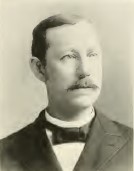 RICHARD ENOS THOMPSON is a
prominent
lawyer and politician of Preston, Fillmore
County, Minnesota. Though a native
of that county, he is of Norwegian ancestry. His
father, Iver Thompson, came from Norway in 1848.
He first lived in Chicago, and while there was
married to Miss Cecilia Walder. Miss Cecilia was
also a native of Norway, but she came to this
country with her parents in 1837, settling in
Michigan. A few years later they came to Fillmore
County and settled on a farm. RICHARD ENOS THOMPSON is a
prominent
lawyer and politician of Preston, Fillmore
County, Minnesota. Though a native
of that county, he is of Norwegian ancestry. His
father, Iver Thompson, came from Norway in 1848.
He first lived in Chicago, and while there was
married to Miss Cecilia Walder. Miss Cecilia was
also a native of Norway, but she came to this
country with her parents in 1837, settling in
Michigan. A few years later they came to Fillmore
County and settled on a farm.
Here their son Richard
was born in the year 1857. He attended the common
schools in his vicinity, following the pursuit of
enlarging their farm work, afterwards as he grew
to manhood, teaching in the district schools of
the vicinity. From 1874 to 1879 he taught almost
continuously, and at the latter date he commenced
the study of law in the office of Judge H. R.
Wells at Preston, Minnesota, and was admitted to
the bar in November, 1881, and entered into
partnership with Judge A. D. Gray, under the firm
name of Gray & Thompson. The firm opened an
office and commenced practice in Preston. They
have been very successful and have built up an
extensive law business, which they still enjoy.
For the last ten years Mr. Thompson,
with his brother, A. W. Thompson, has also been in
the abstract business of Fillmore County, the
office being maintained under the name of Thompson
Brothers having the original and only set of
abstract books and tract index of Fillmore County.
Mr. Thompson has always been
a Republican. At an early date he took an interest
in the local politics and soon became an
influential man in his county. He was deputy clerk
in the district court of Fillmore County from 1881
to 1885. In the fall of 1882 he was elected as a
member of the House of Representatives of the
State Legislature. During the session which
followed he was one of the few who voted for the
Hon. William Windom from first to last in the
memorable struggle in which Windom was defeated by
D. L Sabin. In 1885 Mr. Thompson
was re-elected to the House of Representatives and
served with honor during that term. In November,
1894, he was elected to the State Senate for four
years, ending in 1898. From 1890 to 1895 he was a
member of the State Central Republican Committee.
More than ten years ago Mr. Thompson became a
Master Mason, and is now a Knights Templar in the
Malta Commandery, No. 25, at Preston. On December
16, 1884, he was married to Anna Thompson, and
they have two children, Victor C. born September
26, 1885 and Inez born May 13,
1891.
The information
on Trails to the Past © Copyright may be used in personal family history research, with source citation. The pages in entirety may not be duplicated for publication in any fashion without the permission of the owner. Commercial use of any material on this site is not permitted. Please respect the wishes of those who have contributed their time and efforts to make this free site possible.~Thank you!
|
